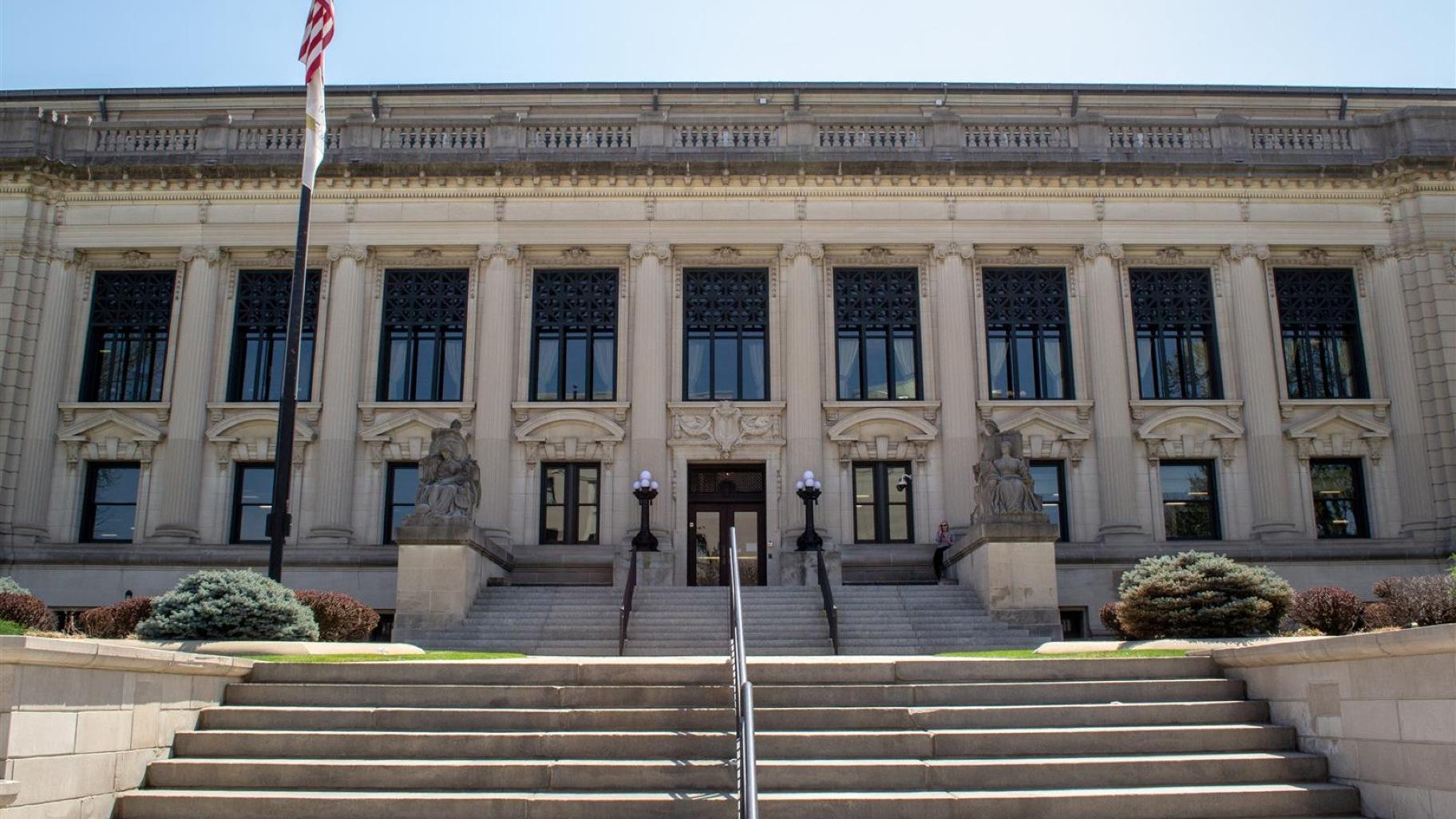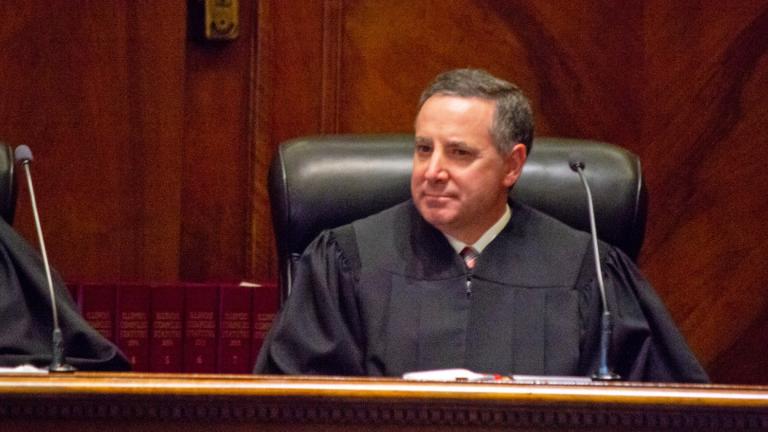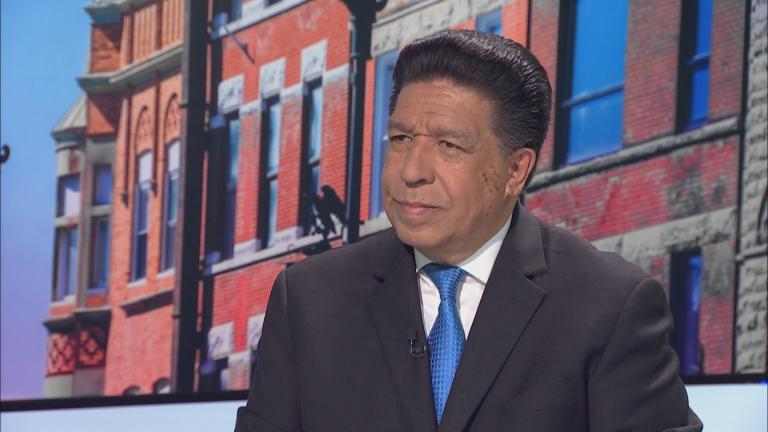 The Illinois Supreme Court building is pictured in Springfield. (Jerry Nowicki / Capitol News Illinois)
The Illinois Supreme Court building is pictured in Springfield. (Jerry Nowicki / Capitol News Illinois)
Illinois’ long-term fiscal situation remains plagued by state pension debt built over decades, but a plan designed to assist burdened local pension funds by pooling them can advance, thanks to an Illinois Supreme Court ruling.
In a unanimous opinion published Friday, the court’s seven justices upheld the decisions of lower courts, and found that Illinois can require local pension funds to merge, as ordered in a 2019 law.
It’s “confirmation that smart, thoughtful pension reform can be accomplished in Illinois,” Gov. J.B. Pritzker said in a statement. “After 70 years of attempts, my partners in the General Assembly and I were able to accomplish meaningful reform during my first term in office.”
Whether the law is producing enough hoped-for cost savings to reduce property taxes that generally pay for local retirement benefits is a separate question, but the court’s ruling permits Illinois to continue trying.
The law consolidated some 650 retirement funds for municipal public safety workers into two funds — one for firefighters and another for police officers. Chicago is not included.
The local funds’ assets are merged only for administrative and investment purposes; their values are protected, in the sense that one fund’s assets can’t be used to shore up another’s.
Rather, the thinking is to rely on an economies of scale theory, in which pooled investments could go further and access bigger opportunities than hundreds of smaller funds, while at the same time saving on administrative expenses by eliminating redundant costs.
Several dozen active and retired pension fund members sued over the changes, arguing that because local members would lose the opportunity to vote for local board members and therefore local control over investment decisions, the law breeches a state constitutional guarantee that membership in a government pension system is “an enforceable contractual relationship, the benefits of which shall not be diminished or impaired.”
“The Act, according to plaintiffs, ‘substantially impacted and diluted’ their voting rights and their rights to control the management of the funds,” Justice Mary Jane Theis wrote.
But the pension protection clause doesn’t apply, justices ruled.
Justices said that protection only covers material benefits of monetary value — the size of a pension check down the road, or promised health care coverage — that remain intact.
“The Act specifically provides that these local (pension) boards retain exclusive authority to adjudicate and award retirement and other benefits,” Theis wrote. “Therefore, the enactment of the Act had no impact on the local pension boards’ responsibility to determine the retirement, disability and death benefits payable to fund members and other beneficiaries.”
Participating in or voting on investment decisions is not part of Illinois’ constitutional guarantee, justices found.
The “Act does not take any of plaintiffs’ private property. As participants in a defined benefit plan, they have a right to receive their promised benefits but do not somehow have a private property right in the source of funding for those payments,” the opinion reads.
It’s thinking in line with Assistant Attorney General Richard Huszagh, who defended the bipartisan law before the state’s high court.
Huszagh said if you asked an average person what’s meant by a retirement benefit, the answer would be: How much money are you going to get?
“None of the members lose a penny of their benefits,” Huszagh said during oral arguments in November. “This is a situation in which essentially nobody loses. None of the members lose a penny of their benefits, and that’s why it got this broad support.”
The law was supported by the Illinois Fraternal Order of Police, the Associated Fire Fighters of Illinois and the Illinois Municipal League, whose director Brad Cole wrote in a Friday memo to members that “the Supreme Court’s decision effectively ends years of costly legal maneuvering and obstruction by special interests that attempted to stop the implementation” of the law.
“Personally, having worked on this issue for more than a decade and as a drafter of the legislation, I am gratified by the consistent rulings in favor of the Act and in the determination that will now allow everyone to focus on strengthening and growing the funds,” Cole wrote.
Illinois’ pension protection clause has been central in previous impactful state Supreme Court decisions, including a 2015 opinion that struck down a law that would have canceled state employees’ automatic annual compounded cost-of-living bumps, capped workers’ pensionable salaries and extended the age upon which a state employee could retire and get full pension benefits.
At the time, lawyers for the state argued the package was an economic necessity given that pension costs were cramping out spending on government’s other responsibilities.
“Today’s ruling shows that smart decision making can produce real savings for taxpayers, while protecting what workers have earned,” House Speaker Emanuel “Chris” Welch said in a statement. “By advancing commonsense reforms, collaborating with stakeholders, and delivering fiscally and socially responsible budgets, we’re continuing to rebuild Illinois’ fiscal house and move our state forward.”
While $142 billion in unfunded state pension liabilities continue to pressure the budget, Pritzker often points to the local pension consolidation law as evidence of taking a whack at the issue.
Neither Welch nor Pritzker’s statements nodded at any future action on pensions, be it local funds or the five under the state’s control.
In addition to calls to make more headway on closing out the mountain of state pension debt, there are also calls to increase pension benefits to state employees, public school teachers and public university employees who were hired after 2011.
In a bid to decrease costs, Illinois offers newer employees a reduced retirement package, but critics fear it went too far in breach of national retirement protections, so the state must now enhance those benefits.
Follow Amanda Vinicky on Twitter: @AmandaVinicky







